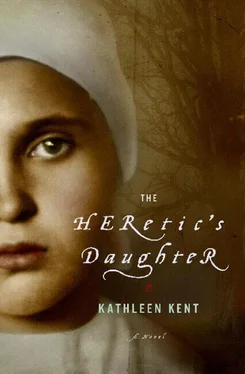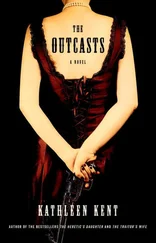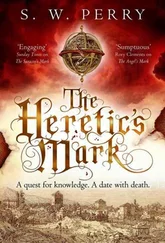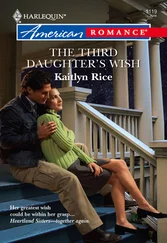“What should we do with this one, do you think?” Mercy craned her neck up at the girls hanging over the gravestone like a pair of gargoyles.
“I say we stuff her mouth with dirt,” Mary offered, all but jumping up and down and clapping her hands.
“Tie her fast to the stone first,” said Phoebe.
Mercy dug her nails into my shoulders, drawing blisters, and said calmly, “I say we bury her in one of the graves.”
I heard my name being called from the meetinghouse yard. Mary hissed to Mercy, “Here comes the Reverend Dane. Best let her go.”
My name was called again, closer this time. Mary called out, “She is here, Reverend Dane. She is with us.” And then to Mercy, “For heaven’s sake, let her go.”
Mercy bent to my ear again and whispered into it as softly as any lover, “Remember the story of Robert Rogers and the Indians who skinned him? How they tied him to the stake after he had died? I lied. Robert Rogers was alive when they burned him. Speak one word of this and I will come to you some night and burn you alive in your bed.” Then she pushed me roughly off her lap and stood brushing the leaves from her skirt. She faced the Reverend and smiled, saying, “Sarah fell running through the stones. We were helping her upright.”
She extended her hand to me, which I ignored, but I did not miss the look that followed like a fiery tail trailing a comet. The Reverend walked back with me to the waiting cart and stood waving to us until we had passed beyond the bending oaks gating the old burial ground. Behind him at a distance were three skirted figures who did not wave but stood close together, impassive and watchful.
TRUE AUTUMN CAME at the end of October, and while the days were yet warm, the evenings grew cooler until the earth put forth an old moldering smell like a sodden blanket or the sharp tang of mint crushed in a glass. The sky in early morning and late afternoon would darken with the passing of carrier pigeons, too numerous to count, on their way southward. Their departure left me sad, as though my true namesakes were abandoning me to another season of cold and unbearable gravity. The waxing and waning of dying embers in the hearth at eventide brought about wakeful visions of places dark and primitive. In my dreams at night I slipped my earthly bonds and flew to those same places, waking in the morning with a cramped and yearning pain in my chest. The visions filled my head until I grew agitated and restless and wandered sullen about the house. The only respite I found was to stand on Sunset Rock, sniffing at the air blowing westerly the thirty miles from Boston Bay, inhaling the last bits of sea foam descending over the salted wastes of Cat Swamp.
I found a shard of crude pottery in the garden near the well and held it in my hand, marveling at the painted markings snaking their way across the length of it. It was very old, worn by years of weather and the action of the earth over its curved form. It was striped with tiny grooves, and I scratched my fingernail over them, hoping to bring forth the sound of its maker from the clay, much as a finger will pluck the strings of a fiddle to bring music. I looked for Father and found him oiling with bear grease two sprung beaver traps that had belonged to my grandfather. He would set them on the southern fork of the Shawshin and harvest any pelts for a new cone of sugar, enough to last us the winter. When I showed him the piece of clay, he held it for a moment and said, “This was not made by Narragans or Abanak. They have no wheel to make such.”
“Who made it, then, Father?” I asked, feeling the chill of holding a thing ancient as the dirt below my feet.
He rubbed his knotted fingers over the pitted face of the clay and said, “Some as came before the Indian and are no more. The history of the world is such, Sarah. To build upon the bones of those who have come before. Thus it will ever be.”
That night as I lay in bed, I knew I would give the shard to Margaret. I could not make a gift fine enough to match hers. But I could give her something that was strange and wonderful and rare. I closed my eyes to sleep and dreamt I was wandering lost through a cornfield. I could hear Margaret calling to me, but wherever I followed the voice, it retreated into the stalks. The voice at last led me to the lip of a well and called up from the depths of the water below. Lying on the lip of the well was the glistening fragment of clay, wet as though risen up from the shaft. The voice floating from the well shifted and changed. It was no longer Margaret but some other girl, calling and calling. I walked to the very edge of the well and peered into the violet shadows and saw, reflected in the dark pool below, my own face. I woke, my face slick with tears, my chest an empty cask.
From that morning a growing resentment started to swell in my chest. I formed a hard and embittered resolution that my mother was responsible for all my losses. Because of her selfishness I was taken from Uncle’s family. Because of her ungovernable anger Uncle would not return to our house, perhaps refusing his family to visit as well. Because of her acid tongue our neighbors talked ill of us and gossiped freely in their homes and in Chandler’s Inn. I even worked my mind around Mercy’s towering deficiencies of character, overlooking her scheming and stealing and bullying, to blame Mother for turning the girl out of the house. Darkest of all were the grudges for the loss of my grandmother, as though my mother through neglect contributed to her death. And when I could no longer hold in my fury, I let out a long, despairing cry. So astonished was she by my wailing, she dropped the braided bunch of onions she was hanging over the hearth to dry. I stood facing her, my fists balled tight at my hips, and screamed, “Why must you take everyone I love away from me?”
Without a word, she picked up her cloak and beckoned for me to follow her out of the house. Expecting a beating, and a short return to the house, I did not wear my cloak, and the cool morning breeze licked at the sweat on my lip like a dog licking a salt wheel. Now it comes, I thought. She is finally to murder me and leave my bones in the fields.
With a glowering face I followed her, walking up and over the elevated path behind the house and through the long harvested fields towards Robert Russell’s farm. Then I thought, She is going to leave me with Robert Russell, and I will be made servant in his house. But we at length passed by his house and turned south into the forest of pine surrounding Gibbet Plain. I could hear a cardinal calling out, “Quit-it, Quit-it, Quit-it-now,” and I suddenly regretted leaving without my cloak, as the wind had turned cooler, ruffling the hair along my arms. I trudged behind Mother, picking her way confidently through the spaces between the trees, and wondered if she would walk all the way to Reading with me in tow. We broke through some branches of thinly spaced fir and entered onto Gibbet Plain. It was a giant meadow, graced with clusters of trees watered on three sides: the Skug River to the east, Foster’s Pond to the west, and a swamp to the south that no one had named, as it was believed to be haunted by those who had been hanged there. I looked at the vast spread of green and yellow grasses, some growing knee high, and my mood lifted despite my efforts to anchor it down with crossed arms and a clenched jaw.
Mother said, “I used to come here with Mary when I was a girl.” I realized that she meant Margaret’s mother, Aunt Mary, but it was hard to think of my restrained mother as a girl gamboling through a field. “The first time I saw the meadow,” she continued, “was when your grandmother brought me here. I was about your age, maybe a bit younger. I had been for a while angry with her, over what I cannot now remember, and I had made myself ill from it. I could not eat nor sleep and would pace the house just as I have seen you do. My mother brought me here and said to me, ‘This one time, until you are grown, you may say whatever you wish to me. Whatever anger you have stored against me or the world you can speak it to me and I will not chastise you or punish you nor reveal to another living soul what you have said.’ ”
Читать дальше












